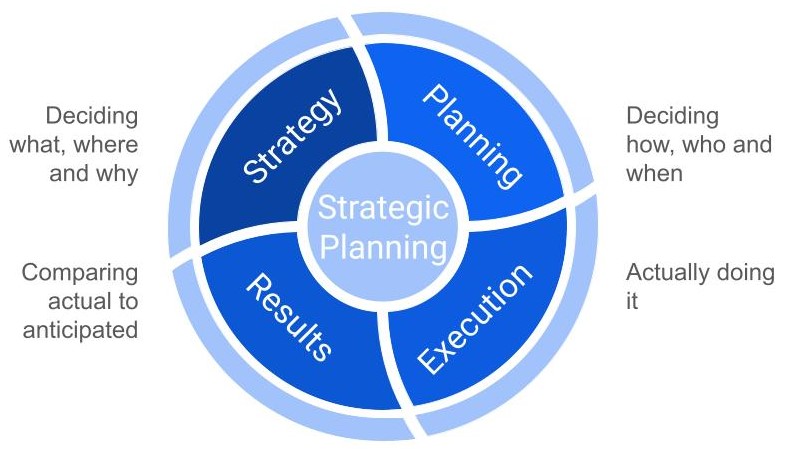Strategic planning is a systematic process whereby an organisation defines its strategy and its plans to pursue this strategy.
Some people say strategy and planning are two different things. But in reality, one doesn’t work without the other. That’s why they are often grouped together as “strategic planning.”
A good strategic plan also includes how to put the plan into action and track the results. That’s important because plans often change. Things outside or inside the organisation can affect what happens next.
The four components of strategic planning
 The four components of strategic planning are:
The four components of strategic planning are:
- Strategy: Deciding what the organisation should do, where it should do it, and why it should do it.
- Planning: Deciding who should do it, how they should do it, and when they should do it.
- Execution: Actually doing it.
- Results: Comparing the actual results (outcomes) to what was anticipated.
In practice, these activities often overlap and repeat. Teams adjust them over time based on
- changes in the outside world and
- how well the organisation is doing compared to its plans.
Strategy
Deciding what the organisation should do, where it should do it, and why. This includes:
- Researching the market. Looking at customer needs, trends, competitors, and how the organisation is performing.
- Using strategy tools like SWOT, McKinsey 7-S, PESTEL, Porter's 5 Forces, Business Model Canvas and/or Value Chain Analysis, BCG Matrices, Pareto Analysis and Scenario Analysis to help with analysis.
- Making decisions about the organisation's strategic direction. Setting clear vision and mission statements, goals, objectives and KPIs.
Learn more:
Planning
Deciding who should do what, how they should do it, and when they should do it. This includes:
- Planning strategic initiatives. Then estimating how long they could take, what resources they will need, and how much they will cost.
- Allocating resources (including people) and budget.
- Identifying and mitigating risks.
- Tools like 3 Horizons, Gantt Charts, Budgets.
Learn more: Turning your strategy into action
Execution
Actually doing it. This includes:
- coordinating activities and
- putting governance structures in place with detailed status and progress reporting and communications.
Execution means putting the plan into action and adjusting it as problems come up and are solved.
Results
Comparing the actual results (outcomes) to what was anticipated. This involves tracking KPIs. (These should have been identified up front when the strategy was determined.)
It is important to track that:
- the organisation did what it said it would do,
but also that - this achieved the outcomes it anticipated it would.
If the strategy has not achieved the anticipated outcomes, then the organisation should adjust its strategy and try again. In this way, strategic planning becomes a fluid, iterative and adaptive process.
You can use tools like the Strategy Scorecard to track results.
Why is Strategic Planning important?
Strategic planning gives an organisation a clear direction. It helps everyone work towards the same goals and use resources wisely. It also helps businesses:
-
Focus on what matters most by setting top priorities.
-
Adapt to change like new trends, technologies, or competitors.
-
Make better decisions by thinking long-term, not just short-term.
-
Track progress using KPIs to see what’s working and what needs to change.
-
Work better together by giving teams a shared vision and purpose.
In short, strategic planning helps turn good ideas into real results. It keeps organisations focused, flexible, and ready for the future.
How to do Strategic Planning
Historically, strategic planning has been quite unstructured. It relied on general-purpose tools like Microsoft PowerPoint, Word and Excel to produce documents. Whilst these might look attractive, they are often disjointed and inconsistent. And they're always out of date the minute they're written.
StratNav provides a structured platform for strategic planning so that plans remain consistent and up-to-date.
Common challenges and pitfalls in Strategic Planning
Strategic planning is essential for success. But organisations often encounter challenges that can derail the process.
Here are some common pitfalls and how to overcome them:
- Lack of Stakeholder Engagement. If key leaders and teams are not involved, the plan may lack buy-in and fail during implementation.
Solution: Foster collaboration and include stakeholders early in the process. - Unrealistic Goals. Setting overly ambitious or vague objectives can lead to frustration and wasted resources.
Solution: Ensure goals are SMART – Specific, Measurable, Achievable, Relevant, and Time-bound. - Failure to Adapt. Sticking rigidly to a plan despite changing circumstances can make the strategy obsolete.
Solution: Regularly review and adjust the plan based on new information or changes in the environment. - Poor Communication. If the strategy is not clearly communicated, teams may struggle to align their actions.
Solution: Develop a clear communication plan to ensure everyone understands the strategy and their role in achieving it. - Neglecting Execution. A well-crafted strategy means little without effective implementation.
Solution: Assign responsibilities, set timelines, and monitor progress with key performance indicators (KPIs).
By recognising these challenges and addressing them proactively, organisations can ensure their strategic planning process delivers real value and drives long-term success.
StratNav will help you to overcome all of these challenges and pitfalls.
What next?
Ready to take your strategic planning to the next level?
✅ Sign up for StratNav – it's free to start
📅 Schedule a demo of StratNav
💬 Book a free consultation to discuss your needs
See also:
- Navigating the Future: Strategic Planning for Business Success
- 27 Best Strategic Planning Tools for 2025
- Strategic Planning Software for SMEs: The Key to Sustainable Growth
- How does StratNav aid strategic planning and execution?
- Strategic planning: Why Strategy and Planning Must Align
